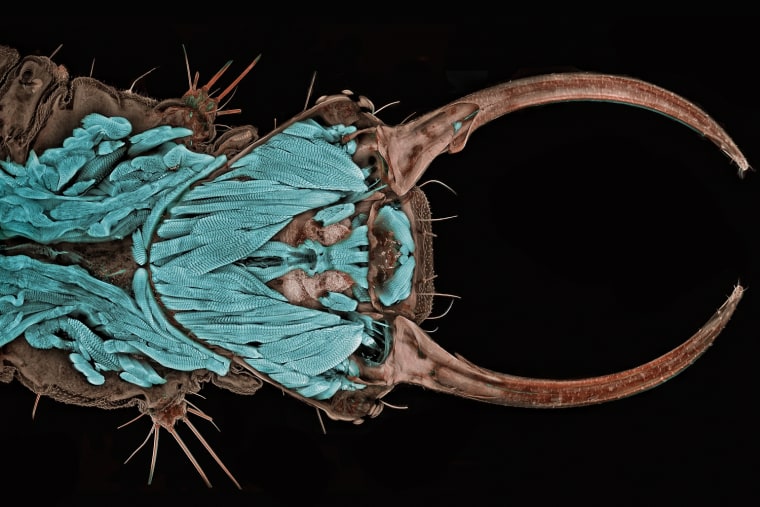It's a good thing that Igor Siwanowicz didn't smash the bug that bit him. A photomicrograph of that pesky lacewing larva has won first place in this year's edition of the prestigious Nikon Small World Photomicrography Competition.
Siwanowicz, a biochemist and photographer who lives in Madison, Wis., said the story of his prize-winning picture began when the bug started "fiercely digging its mandibles" into his skin. Instead of swatting the bug away, he pulled out the test tube that he always carries in his pocket for occasions like this, slipped the insect inside and fired up the microscope.
As described in a Nikon news release, Siwanowicz had only one chance to capture the image he had in mind, due to the specific requirements for the bug's dissection. He carefully fixed and dyed the sample, then set up his confocal microscope for 20x magnification. The resulting picture reveals the lacewing's 1.3-millimeter-long head, and those fierce mandibles, in startling detail.
Siwanowicz, who completed his doctoral studies in protein crystallography but now works in invertebrate photography for research, sees his work not just as a technical aspect of a science project, but as a true artform.
"My art causes a dissonance for its viewer — a conflict between the culturally imprinted perception of an insect as something repulsive and ugly, with a newly acquired admiration of the beauty of its form," he told Nikon. "My hope is that in some way, my photomicrographs prompt people to realize the presence of culturaly programming, question it, and eventually throw it off as an illusion. I am so pleased to be recognized by Nikon Small World for this philosophy, but also for the technical expertise it required to capture this photo."
Dissonance between the macro and micro worlds is a theme in this year's crop of top Small World photos, which I had a hand in selecting as a member of the judging panel. A blade of grass turns into a forest of color. The surface of a microchip glows like a gaudy neon sign. A tiny sprig of liverwort becomes a chain of scaly alien hands. Cracked solar-cell film takes on the beauty of a black-and-white abstract painting.
To get the bigger picture, check out our slideshow of the contest's top 20 images, then go on to the Small World website to see the honorable mentions, this year's "Images of Distinction" and still more distinctive images from past competitions. You'll also enjoy Siwanowicz's voluminous gallery on DeviantART.
This year's 37th annual Small World contest drew hundreds of entries from almost 70 countries around the world. Siwanowicz receives $3,000 worth of Nikon gear for his first-place photograph — with gift certificates of lesser amounts, ranging from $2,000 to $100, going to the others on the top-20 list. Eric Flem, communications manager for Nikon Instruments, said it was "our privilege to honor the talented researchers and photomicrographers who submit their amazing work."
"As evidenced by Dr. Siwanowicz ... marrying technique and aesthetics is no easy feat," he said. "We are proud that this competition is able to showcase this beautiful imagery and demonstrate some of the many facets of science."
More glimpses of microscopic worlds:
- Nikon Small World's top 20 for 2011
- Nikon Small World's top 20 for 2010
- Olympus Bioscapes' top 10 for 2010
- Olympus Bioscapes' top 10 for 2009
- The world within a drop of water
- Greatest hits from Nikon Small World
- Visualizing science in 2010
- Visualizing science in 2009
Top images from the 2011 Nikon Small World competition will be exhibited in a full-color calendar and through a national museum tour. For additional information, visit the Small World website or follow the conversation on Facebook and Twitter @NikonSmallWorld.
My colleagues on the judging panel for this year's contest included USA Today science columnist Dan Vergano; Simon Watkins, founder and director of the University of Pittsburgh Center for Biological Imaging, as well as a professor at the University of Pittsburgh Medical School; and Richard Day, physiology professor at the Indiana University School of Medicine.
Connect with the Cosmic Log community by "liking" the log's Facebook page or following @b0yle on Twitter. You can also add me to your Google+ circle, and check out "The Case for Pluto," my book about the controversial dwarf planet and the search for new worlds.
